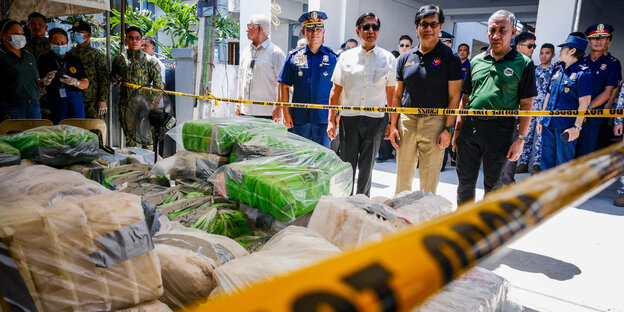In the southern Philippines, the Duterte clan launches another bloody war on drugs. President Marcos Jr. simply keeps his distance.

President Ferdinand Marcos Jr. (white shirt) and his Interior Minister inspect 1.4 tons of seized drugs on Tuesday Photo: afp
SEDAN taz | “I'm telling you now: turn yourself in, get out or I'll kill you.” With these words, Sebastian Duterte, mayor of Davao City in the southern Philippines, declared war on drug users and traffickers on March 22.
The mayor's words were immediately followed by actions. In just 24 hours, police shot dead five suspected traffickers in the main city on the island of Mindanao. To date there have been many more murders, allegedly committed by the police and Davao's notorious death squads.
Sebastian Duterte has unleashed another round of arbitrary police killings, said Bryony Lau, deputy Asia director at Human Rights Watch. “But the sad reality is that these murders never stopped.”
The Davao death squads were founded in 2007 by Rodrigo Duterte, former mayor of Davao and father of the current incumbent. At that moment, the old man declared his “war on drugs” with the same words as his son now.
Hundreds of people were killed in Davao in the following years. When Rodrigo Duterte became president in 2016, he expanded the war on drugs across the country.
His son's new war on drugs in Davao can certainly be seen as an admission of the failure of his father's policy of eradicating mass drug consumption through bloody violence. The Dutertes have been ruling Davao for a good 33 years without any change in the undeniable drug problem.
The gap is growing
When Duterte Sr. became president, his daughter Sara became mayor for the first time. His brother Paolo became deputy mayor until he had to resign from his position due to rumors about his involvement in large-scale drug trafficking.
When Sara Duterte was elected vice president to Ferdinand “Bongbong” Marcos Jr., her father's successor as president, in 2022, her brother Sebastian became mayor of Davao.
During Marcos Jr.'s 20-month presidency, more than 580 people have been shot in drug raids. This year there were 75 in mid-March.
In a third of the cases, the alleged perpetrators were police officers. These numbers come from data published monthly on day from the Dahas Research Project on Violence, Drug War and Human Rights of the University of the Philippines. Davao is one of the hotspots for extrajudicial killings.
For comparison: According to police, more than 6,400 suspected drug offenders were shot to death in the street during Duterte Sr.'s six-year rule. Human rights activists, by contrast, estimate up to 30,000 murders, most of which were allegedly committed by death squads.
The victims were suspected drug users or small traffickers from the slums, while the big drug traffickers and their helpers from the police, customs and authorities remained virtually unscathed.
During the Marcos Jr. government, police and customs officials repeatedly confiscated large quantities of drugs. Most recently, on Monday this week, 1.4 tons of shabu (methamphetamines) in Batangas province.
“This is the largest shipment of shabu ever confiscated here. No one was killed, no shots were fired, no one was injured. “We simply proceeded with precision,” Marcos Jr. said, praising his “bloodless war on drugs,” thus distancing himself from the Dutertes.
Almost two years after the electoral victory, not much remains of the “unity team” of the Marcos and Duterte clans. The gap between the two political dynasties is widening on major political issues. The upcoming mid-term parliamentary elections in May 2025 will set the course for the 2028 presidential elections.
